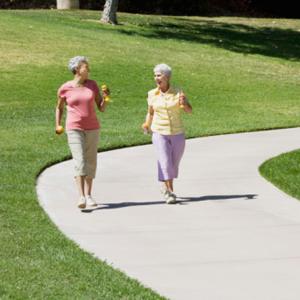This is the VOA Special English Health Report.
Increasing evidence suggests that being active can reduce a person's risk of dementia. Dementia is the name for the effects of Alzheimer's disease, stroke and other brain disorders.
People may be considered to have dementia if they lose abilities in two or more areas such as memory and language skills. Other signs of dementia include a loss of ability to think clearly or control emotions.
The World Health Organization says about 35 million people worldwide are living with dementia.
Most studies of exercise and dementia depend on self-reporting -- asking people to report their levels of physical activity. Laura Middleton is a researcher at the Sunnybrook Research Institute and the University of Waterloo in Canada. She says there are problems with self-reporting.
LAURA MIDDLETON: "It does a very good job of capturing jogging, or biking or tennis but does a relatively poor job of capturing low-intensity activity like walking or daily chores, which may also be important to the risk of cognitive impairment."

So, Professor Middleton led a team in a new study to measure activity levels scientifically. The study lasted five years. Almost 200 people took part. Their average age was 75.
The people drank small amounts of what scientists call doubly labeled water. It contains forms of hydrogen and oxygen that can mark, or label, these elements within body water. This way scientists can measure energy use through urine tests.
Laura Middleton says the research showed that even low-intensity activity reduced the risk of thinking problems and memory loss.
LAURA MIDDLETON: "Those with higher activity energy expenditure had 90 percent reduced risk of incident cognitive impairment over the follow-up period compared to those with very low activity energy expenditure."
The study is published in the Archives of Internal Medicine.
In a second study, French researchers reported on exercise and dementia in women with heart risks like obesity or diabetes.
Marie-Noel Vercambre of the Foundation for Public Health in Paris led the study. The findings suggest that even a half-hour walk at a quick speed every day could lower the risk of cognitive impairment.
Dr. Eric Larson of the Group Health Research Institute in Seattle, Washington, wrote a commentary about the studies. He says the findings add to the evidence about the mental value of physical activity.
ERIC LARSON: "It's not obvious to people that exercise would make your brain healthier. And as each study does more detailed analyses of special groups or a different way of making the measurements, it just makes the scientific basis for this relationship a lot more convincing."
And that's the VOA Special English Health Report, written by Caty Weaver. For more health news and to learn English, go to voaspecialenglish.com. I'm Jim Tedder.
dementia: a serious mental disorder caused by brain disease or injury, that affects the ability to think, remember and behave normally 癡呆;精神錯(cuò)亂
diabetes: a medical condition, caused by a lack of insulin, which makes the patient produce a lot of urine and feel very thirsty 糖尿病;多尿癥
The struggle for a dependable test for Alzheimer's disease
Are people who speak more than one language smarter?
Weight loss surgery can reverse diabetes
(來源:VOA 編輯:實(shí)習(xí)生高美)
